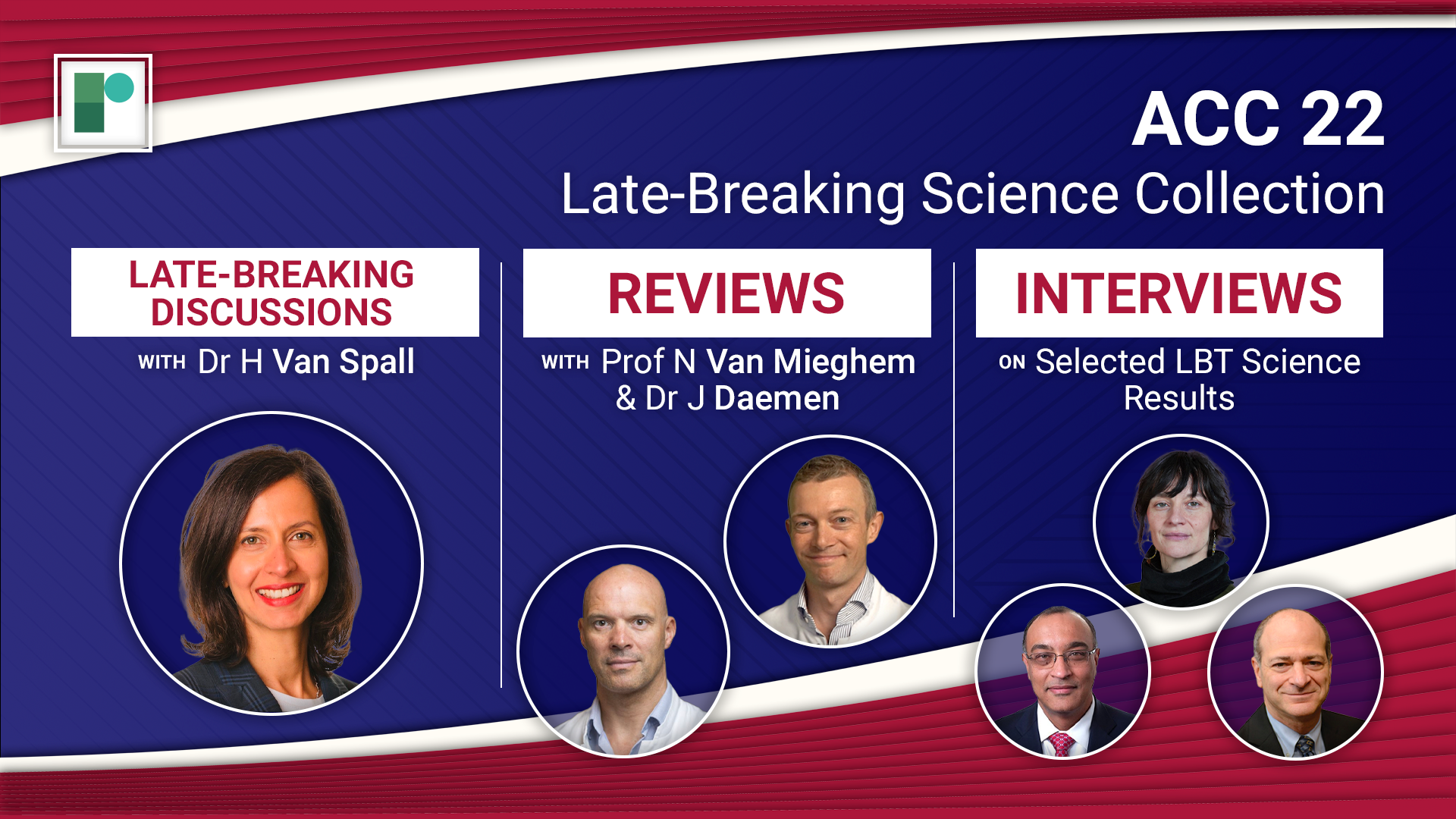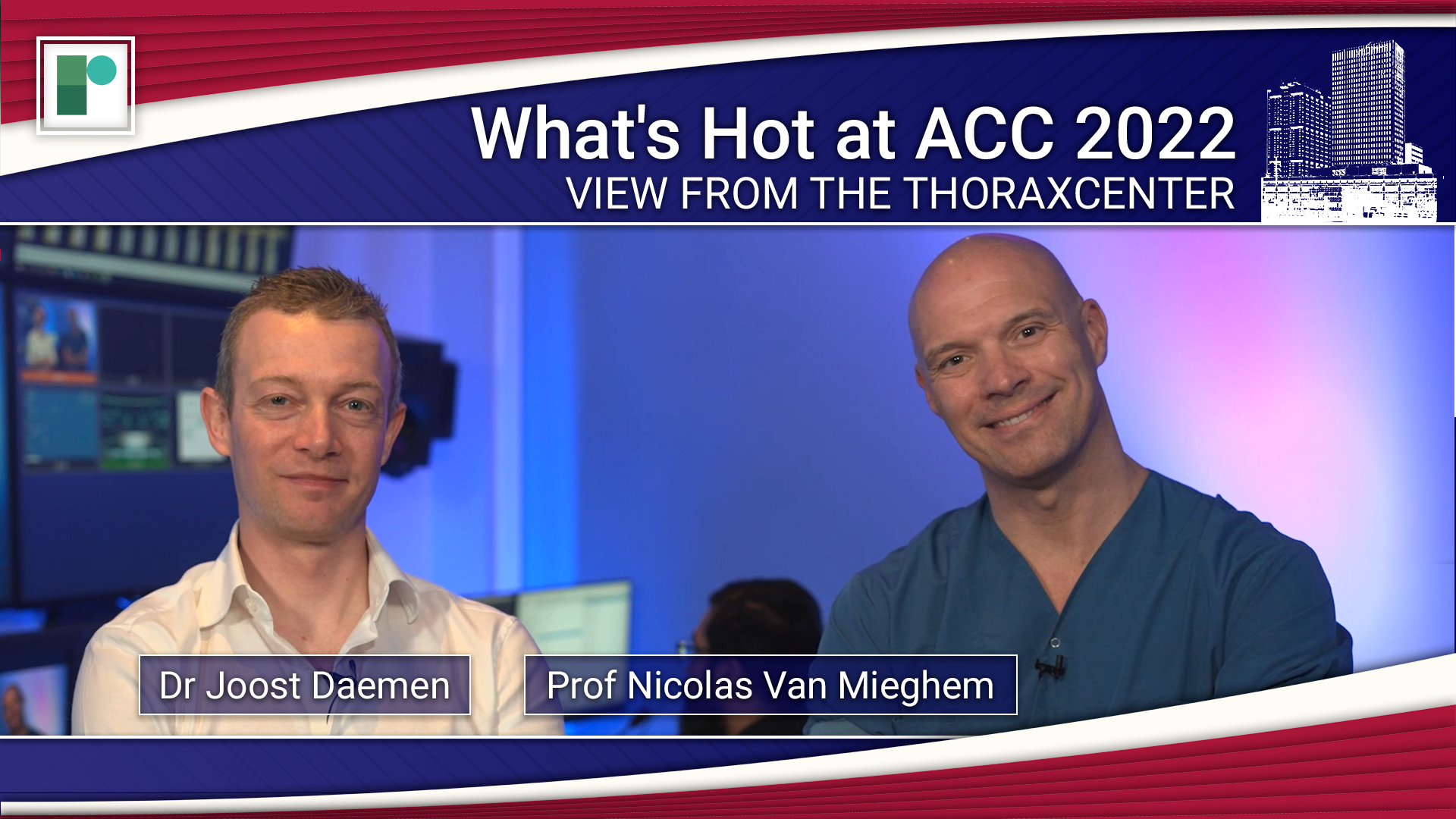ACC 2022: Late-breaking Science Video Collection
Published: 05 April 2022
-
Views:
 7614
7614
-
Likes:
 7
7
-
Views:
 7614
7614
-
Likes:
 7
7
-
 Up Next
Up Next -
 9m 27s
9m 27s -
 5m 35s
5m 35s -
 10m 24s
10m 24s -
 3m 50sPart 3 | Session 18 ACC 22: 3-year Efficacy Outcomes from the SPYRAL HTN-ON MED Med Pilot Study
3m 50sPart 3 | Session 18 ACC 22: 3-year Efficacy Outcomes from the SPYRAL HTN-ON MED Med Pilot Study -
 4mPart 3 | Session 19 2022 AHA/ACC/HFSA Guideline for HF Management: Highlights & Implementation
4mPart 3 | Session 19 2022 AHA/ACC/HFSA Guideline for HF Management: Highlights & Implementation
-
 12m 6sPart 4 | Session 1 ACC 22: 3 Trials That Will Change Your Practice with Dr Purvi Parwani
12m 6sPart 4 | Session 1 ACC 22: 3 Trials That Will Change Your Practice with Dr Purvi Parwani -
 6m 15s
6m 15s -
 7m 9sPart 4 | Session 3 4 Lipid Late-breaker Highlights from ACC.22 with Dr Erin Michos
7m 9sPart 4 | Session 3 4 Lipid Late-breaker Highlights from ACC.22 with Dr Erin Michos
-
 23m 9sPart 1 | Session 1 ACC 22 Late-breaking Science Preview Nicolas M Van Mieghem, Joost Daemen
23m 9sPart 1 | Session 1 ACC 22 Late-breaking Science Preview Nicolas M Van Mieghem, Joost Daemen
-
 28m 6sPart 1 | Session 2 ACC.22 Late-breaking Science Wrap-Up Nicolas M Van Mieghem, Joost Daemen
28m 6sPart 1 | Session 2 ACC.22 Late-breaking Science Wrap-Up Nicolas M Van Mieghem, Joost Daemen
-
 16m 42sPart 2 | Session 1 ACC 2022 Late-breaker Discussion: The SODIUM-HF Trial Justin Ezekowitz, Harriette Van Spall
16m 42sPart 2 | Session 1 ACC 2022 Late-breaker Discussion: The SODIUM-HF Trial Justin Ezekowitz, Harriette Van Spall
-
 16m 57sPart 2 | Session 2 ACC 2022 Late-breaker Discussion: The SuperWIN Trial Harriette Van Spall, Dylan L Steen
16m 57sPart 2 | Session 2 ACC 2022 Late-breaker Discussion: The SuperWIN Trial Harriette Van Spall, Dylan L Steen
-
 15m 38sPart 2 | Session 3 ACC 22 Late-breaker Discussion: The PROMPT-HF Trial Harriette Van Spall, Gregg C Fonarow, Tariq Ahmad
15m 38sPart 2 | Session 3 ACC 22 Late-breaker Discussion: The PROMPT-HF Trial Harriette Van Spall, Gregg C Fonarow, Tariq Ahmad
-
 22m 47sPart 2 | Session 4 ACC 22 Late-breaker Discussion: The DIAMOND Trial Harriette Van Spall, Javed Butler, Faiez Zannad
22m 47sPart 2 | Session 4 ACC 22 Late-breaker Discussion: The DIAMOND Trial Harriette Van Spall, Javed Butler, Faiez Zannad
-
 9m 38sPart 3 | Session 1 ACC 22: Findings from the VALOR-HCM Trial Milind Y Desai
9m 38sPart 3 | Session 1 ACC 22: Findings from the VALOR-HCM Trial Milind Y Desai
-
 7m 19sPart 3 | Session 2 ACC 22: MAVA-LTE Shows Improvement in NYHA Class in Patients Treated with Mavacamten Florian Rader
7m 19sPart 3 | Session 2 ACC 22: MAVA-LTE Shows Improvement in NYHA Class in Patients Treated with Mavacamten Florian Rader
-
 3m 19sPart 3 | Session 3 ACC 22: Results From the PACIFIC AF Trial Manesh R Patel
3m 19sPart 3 | Session 3 ACC 22: Results From the PACIFIC AF Trial Manesh R Patel
-
 3m 6sPart 3 | Session 4 ACC 22: FAME 3 Suggests CABG Outperforms FFR-Guided PCI in Patients with Multivessel Disease Frederik Zimmermann
3m 6sPart 3 | Session 4 ACC 22: FAME 3 Suggests CABG Outperforms FFR-Guided PCI in Patients with Multivessel Disease Frederik Zimmermann
-
 3m 54sPart 3 | Session 5 ACC 22: Results from the TRANSLATE-TIMI 70 Trial Brian Bergmark
3m 54sPart 3 | Session 5 ACC 22: Results from the TRANSLATE-TIMI 70 Trial Brian Bergmark
-
 4m 22sPart 3 | Session 6 ACC 22: Results from the POISE-3 Trial Philip J Devereaux
4m 22sPart 3 | Session 6 ACC 22: Results from the POISE-3 Trial Philip J Devereaux
-
 6m 30sPart 3 | Session 7 ACC 22: ICD Shock Therapies and the Burden of Ventricular Tachycardia Paolo Della Bella
6m 30sPart 3 | Session 7 ACC 22: ICD Shock Therapies and the Burden of Ventricular Tachycardia Paolo Della Bella
-
 6m 3sPart 3 | Session 8 ACC 22: PACMAN-AMI Shows Reduced Plaque Regression in AMI Patients Treated with Alirocumab Lorenz Räber
6m 3sPart 3 | Session 8 ACC 22: PACMAN-AMI Shows Reduced Plaque Regression in AMI Patients Treated with Alirocumab Lorenz Räber
-
 3m 31sPart 3 | Session 9 ACC 22: Magnitude & Duration of Effects of a siRNA Targeting Lp(a) Steven E Nissen
3m 31sPart 3 | Session 9 ACC 22: Magnitude & Duration of Effects of a siRNA Targeting Lp(a) Steven E Nissen
-
 4m 48sPart 3 | Session 10 ACC 22: Results From a sub-study of the POISE-3 Trial Maura Marcucci
4m 48sPart 3 | Session 10 ACC 22: Results From a sub-study of the POISE-3 Trial Maura Marcucci
-
 2m 55sPart 3 | Session 11 ACC 22: Findings from the CoreValve US Pivotal & SURTAVI Trials Michael J Reardon
2m 55sPart 3 | Session 11 ACC 22: Findings from the CoreValve US Pivotal & SURTAVI Trials Michael J Reardon
-
 7m 44sPart 3 | Session 12 ACC 22: ADAPT-TAVR Shows SLT Does Not Affect CO for Patients After TAVR Duk-Woo Park
7m 44sPart 3 | Session 12 ACC 22: ADAPT-TAVR Shows SLT Does Not Affect CO for Patients After TAVR Duk-Woo Park
-
 5m 41sPart 3 | Session 13 ACC 22: Results From the Chocolate-Touch Study
5m 41sPart 3 | Session 13 ACC 22: Results From the Chocolate-Touch Study
Overview
Our regular review series View from the Thoraxcenter hosted by Prof Nicolas Van Mieghem and Dr Joost Daemen (Thoraxcentre, Erasmus MC, Rotterdam, NL) provide a concise analysis of the late-breaking science results and spotlight impactful data.
For a deeper dive into key clinical trial data, Dr Harriette Van Spall (McMaster University, Hamilton, CA)talks with principal investigators in her regular Late-Breaker Discussion Series.
Short, accessible Expert Interviews were conducted with select faculty focusing on the results, applicability, and impact on future research.
More from this programme
Part 1
View from the Thoraxcenter
Part 2
Late-breaker Discussion Series
Part 3
Expert Interviews
Faculty Biographies
Transcript
- I'm Marie-Sophie De Koning. I'm the PhD candidate and a lead author of the Groningen Intervention Study for the Preservation of Cardiac Function with Sodium Thiosulfate after Myocardial Infarction, affiliated with the University Medical Center Groningen.
Study Objectives
- This is a trial that we designed after a lot of experimental data that looked very promising. So there were cellular data from mice, from rats, from pigs, from dogs, that all looked very promising in the preservation of myocardial infarction.
Study Design and Patient Cohort
- The study was designed as a randomised, multicentre, placebo-controlled trial and the patients, 380 patients, were enrolled, presenting with a first STEMI and they had to have ongoing complaints and/or ST-deviation, directly after arrival at the cath lab. They were assigned to receive either sodium thiosulfate, twelve and a half grams intravenously, or matching placebo and they received a second dose six hours later.
Study Results
We observed that the mean infarct size in the placebo group was 8.9%, in the sodium thiosulfate group, mean infarct size was 8%. So, we did not observe a reduction in infarct size between groups, between arms.
Take-home Messages for Clinicians
- Well, of course, the outcome was very disappointing but I think we still learned a lot. It is very difficult to design trials in the ischaemia reperfusion arena but it still has potential opportunities in other settings, for example, in the chronic heart failure or other conditions that have been tested experimentally but it shows us just how difficult it is to translate animal experimental findings to real clinical benefits.
Further Study Recommendations
So, further studies in the acute setting. In the Netherlands, the STEMI network is so efficient that patients are presenting within 90 minutes on efforts, so the average infarct size was also below 9%. So, we don't know whether this might be beneficial when they're presenting at a later time, when there is more, longer duration of ischaemia. And we also do not know whether it might be beneficial in long-term treatment.







